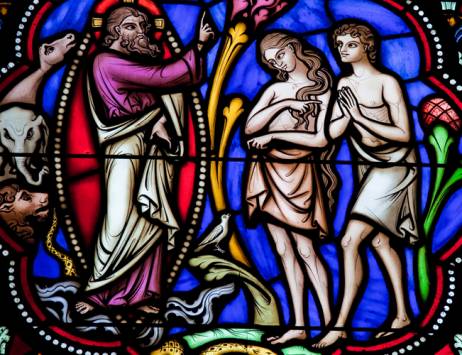The first lines of great books matter. They matter a lot, in fact. Consider a few examples:
- “In my younger and more vulnerable years my father gave me some advice that I’ve been turning over in my mind ever since.”
— F. Scott Fitzgerald, The Great Gatsby (1925)
- “There are dragons in the twins’ vegetable garden.”
— Madeleine L’Engle, A Wind in the Door (1973)
- “Ba-room, ba-room, ba-room, baripity, baripity, baripity, baripity—Good.”
— Katherine Paterson, Bridge to Terabithia (1977)
Of course, the first few words of a book don’t tell you everything. There are settings, details, and plot twists yet to unfold. But these first lines do unmistakably tell you something. In a variety of ways, the first few words of any book set the table for what is to come. They do so through communicating the tone of the book and help you begin to feel what type of book you are entering into.
That’s also true with the Bible. Consider the first four words of Scripture, perhaps the most famous first words of any book ever written or read:
“In the beginning, God . . . .”
Only four words. And yet those four words communicate some essential details that will carry you all the way through the remainder of the text. Here are three such essentials we learn from these four short words.
There was a beginning
That might sound obvious to the point of obnoxious but consider just how important it is to the way we view the world. To know that there was a beginning means there was some sort of instigating cause. It implies some kind of intentionality. Of control. Of design. Further, it puts human beings in their place by reminding us that we did not cause all that we see and know to come into being; rather, we are only a part of what comes next. If there was a beginning, in other words, then there was also a “beginner,” and that beginner is not a human being. Which leads us to the next essential detail communicated in this opening line.
There is a main character
These first four words actually give name to the “Beginner” in question. God. He was not part of the beginning; He existed outside of and prior to the beginning of everything else. And if that’s true, then He has power and authority over everything that comes next. He is not bound by the constraints set up in “the beginning” for He is apart from it.
It’s interesting to note what doesn’t appear in those first four words: You. Me. None of us. Only God. That’s because God is the main character. Everything revolves around Him. And until we read this book from that perspective, we will always miss the main point of what it’s trying to communicate.
There is a purpose
What is the meaning of life? We’ve all asked it at one time or another and in a variety of circumstances. But we should be careful here, lest we forget these first four words, because this is not a book primarily given to help us find our purpose. It is a book about God.
By introducing God here, in the first line, we are left questioning just who this God is and what He is like. This is the purpose of all that follows. Yes, we will find ourselves in its pages; yes, we will find wisdom for life in the subsequent chapters; yes, we will even find practical answers for some of our cosmic questions. But the main purpose for the book we have opened is right there in front of us. It’s that we might know God and know what He is like.
What, then, do we find in the greatest opening of the greatest book? We find the origin. And the One behind the origin. And we find our minds and hearts being opened to know and understand just who He is and what He is doing in this world.







1 reply on “In the Beginning God Created”
Explained very clear letting you know God is the beginning of all things he is the creator of all things